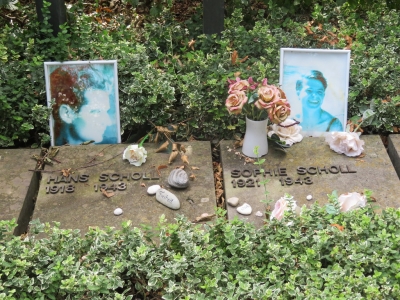
It is said that nothing in this world is constant, except change. This could be a change in situation, a change of place, a change in friends, or even a change in ideology.
This is the story of two siblings – Hans and Sophie Scholl – who were executed 77 years ago, on February 22, 1943 for speaking up against the Nazi regime in Germany in a non-violent way, using the power of language.
Growing up in Nazi Germany
Hans and Sophie Scholl were two among five children born to Robert and Magdalena. Hans, the elder of the two, was born in 1918, and Sophie in 1921.
The siblings were still in school when the National Socialist German Workers’ Party’s (the Nazi party) leader Adolf Hitler took power in 1933 as Chancellor of Germany.
Robert, their father, was a liberal man and taught his children tolerance. He did not approve of Germany’s new leader. However, Hans and Sophie grew up being fascinated with the idea of National Socialism. Both of them joined the youth wings of the party – Hitler Youth, and Union of German Girls – and quickly held leadership positions.
A change in views
During their time with the youth wing, the siblings witnessed the party. They realised that this was against their idea of National Socialism and slowly started to move away.
By 1942, the siblings left the youth wings. The same year, Hans, who was studying medicine at the University of Munich, was called to the Eastern Front to serve at the warfront along with other Medicine students. In the three months he spent at the Front, Hans witnesses the inhumanity of his government and the massive destruction caused by war. The students were also concerned about the fate of Jews who were deported.
By the time he returned, Hans was completely against the Nazi rule.
The White Rose
Soon, at the University of Munich, where the Schools were studying, a group started forming. Hans, Sophie, a few other students, and a philosophy professor formed the core of the group that came to be known as The White Rose – a student-led resistance movement.
The group managed to acquire a manual printing press and began creating leaflets that urged and encouraged people to resist the Nazi rule. “Do not forget that every nation deserves the government that it endures,” they wrote in the first pamphlet.
The White Rose started mailing the pamphlets to random people in the phone directory, took them in suitcases with them wherever they went, and left them in phone booths. They even started painting graffiti on the walls of the University of Munich with slogans such as “Freedom” and “Hitler the Mass Murderer”. Some of their work began spreading to places as far as Austria.
The White Rose did all this anonymously, since anti-Nazi speech was being monitored carefully by the Gestapo (the secret state police).
Capture and execution
On February 18, 1943, Hans and Sophie carried a suitcase filled with leaflets to the University of Munich and distributed them anonymously. They decided to empty the extra leaflets into the courtyard and were caught by custodian Jakob Schmid, who immediately informed the Gestpo.
The siblings were arrested and interrogated for nearly four days. Though they initially denied the acquisition, they later admitted to it, in a bid to save the other members of The White Rose. However, a note in Hans’ pocket unwittingly gave away the name of a third member.
On February 22, 1943, the three members were sentenced to death by the People’ Court, led by Judge-President Roland Freisler.
They were executed the same day by guillotine.
Subsequently, other members of The White Rose were captured and executed or imprisoned. But their resistance had left its mark.
What makes them special?
The Schools were courageous. They weren’t afraid to admit they were wrong in supporting the Nazi party, and neither were they afraid to raise their voices against the crimes committed by the Nazi government.
Picture Credit : Google

